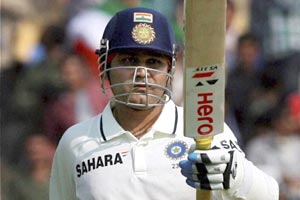 Mumbai, Jan 13: Here are the bare facts: Virender Sehwag is 35; he sports glasses/contact lenses; he hasn’t scored a century since November 15, 2012; he has squandered starts; his last 15 outings in first-class cricket have yielded a solitary fifty; he has batted at every position from one to six and has averaged less than 20 in the Ranji Trophy this season. Simply put, the greatest Indian opener since Sunil Gavaskar is going through a torrid time.
Mumbai, Jan 13: Here are the bare facts: Virender Sehwag is 35; he sports glasses/contact lenses; he hasn’t scored a century since November 15, 2012; he has squandered starts; his last 15 outings in first-class cricket have yielded a solitary fifty; he has batted at every position from one to six and has averaged less than 20 in the Ranji Trophy this season. Simply put, the greatest Indian opener since Sunil Gavaskar is going through a torrid time.
Sehwag’s tough phase has lasted agonisingly long. When the Delhi Daredevils showed no interest in retaining him for the 2014 IPL, it would have been the lowest point in his career. Now, Sehwag looks lost and forgotten, with neither direction nor (cover) drive. For those who love him, there isn’t a more lethal batsman than Sehwag. All they want is to see him effortlessly hoick quickies all over the park, as if it was just another day in office for him. At his peak, he was credited with the fastest reflexes and the best hand-eye coordination. Is it that age has withered him or is it just lack of motivation?
Sehwag has another diverse interest now, the multi-crore Sehwag International school in Jhajjar, Haryana, where he spends a lot of time, suggesting that his mind is not fully on cricket now.
Sehwag has seldom given a damn about technique: his greatest assets are a clutter-free mind, hand-eye coordination and bat speed. Alas, those very unorthodox methods that fetched him over 8,000 runs in both forms of the game have come back to haunt him. The man who delighted fans and terrorised world-class attacks with his unique brand of daredevilry is now struggling against the most pedestrian of bowlers. But every now and then, he has scored those boundary-laced 20s and 30s, thereby keeping the spark alive.
If Sehwag wants to make a comeback, everything has to go his way –– his ageing body has to work overtime, his weakening reflexes need a serious dose of recharge; he must work harder; score runs by the bucketful and hope that the Shikhar Dhawans and M Vijays suffer a string of failures. The odds are stacked against him.
According to Pravin Amre, a technician par excellence, motivation or lack of it is the biggest factor. “To play any form of cricket, one needs to concentrate hard. And if you ask me, it is in fact tougher to motivate yourself and be focused for a first-class or club-level match than in international cricket,” says the former India batsman who has coached domestic giants Mumbai, IPL discards Pune Warriors and India cricketers Suresh Raina and Robin Uthappa.
“You can’t say Viru has a poor technique. How did he play 104 Tests then? His methods work for him. So there is no point in going about making a radical change now. All he needs to do is make little adjustments here and there. You need motivation, sincerity and a focused mind to back you,” Amre said.
Former India opener Chetan Chauhan has watched Sehwag from close quarters. Now a senior official in the Delhi and District Cricket Association, he, too, hopes Sehwag can fight the demons and stage a memorable comeback. “Work harder, play more matches, alter your back foot play, don’t go searching for the ball and trust your instinct,” is Chauhan’s advice. “The moment he starts getting runs, everything will fall into place. Runs are runs, so it doesn’t matter if you get them for your company (ONGC) or local club or state or country. He is a great player. Let’s not forget that,” Chauhan said.
Sehwag, or any player of his calibre, can do the unthinkable and have that final flourish. But it will be an uphill task. If Sehwag was as technically sound as, say, a Rahul Dravid, then he wouldn’t have been out of the Indian team for as long as 10 months. What’s more, even Delhi Daredevils, of which Sehwag was an icon player and skipper, refused to retain him ahead of the IPL-7 auction.
Mughda Bavre, a psychologist attached to the Mumbai Cricket Association, offers a different perspective. “Who are we to question his motivation levels? The very fact that he is playing domestic cricket shows that he is motivated,” she says. “When it comes to established players like Sehwag, there is no question of doubting their inner drive. You and I might believe that he as achieved everything. But we don’t really know what his goals are. Everybody is citing his age as a problem. But he may be wanting to prove everyone wrong by making a comeback at 35. The thing with high-performing individuals like Sehwag is that you can’t write them off till they decide it’s time. That he is still playing is good enough reason for me to believe that he is motivated.”
That Sehwag is still playing state and club cricket shows that one day yet again from the depths of his memory he will replay one of the grand innings that changed cricket for ever.
Vitamins for Viru
Set goals and work harder
Consult coaches and former teammates like Sachin Tendulkar and Rahul Dravid, who played till their 40s
Play, play and play. Runs are runs... no matter where you score
Stick to strengths: make slight adjustments; don’t go for a complete overhaul in technique
Increase focus on cricket.





Comments
Add new comment